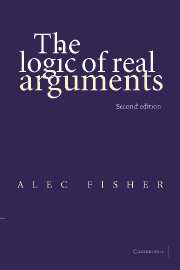Book contents
- Frontmatter
- Contents
- Preface to the first edition
- Preface to the second edition
- Acknowledgements
- 1 Introduction
- 2 A general method of argument analysis
- 3 A first example – from Thomas Malthus
- 4 Reasoning about nuclear deterrence
- 5 An example from John Stuart Mill
- 6 Arguments about God's existence
- 7 How do your mind and body interact?
- 8 Suppose for the sake of argument that …
- 9 An example from Karl Marx
- 10 Evaluating ‘scientific’ arguments. Some initial examples
- 11 Philosophical assumptions
- Appendix: Elementary formal logic
- Exercises
- Bibliography
- List of further reading
- Index
1 - Introduction
Published online by Cambridge University Press: 05 June 2012
- Frontmatter
- Contents
- Preface to the first edition
- Preface to the second edition
- Acknowledgements
- 1 Introduction
- 2 A general method of argument analysis
- 3 A first example – from Thomas Malthus
- 4 Reasoning about nuclear deterrence
- 5 An example from John Stuart Mill
- 6 Arguments about God's existence
- 7 How do your mind and body interact?
- 8 Suppose for the sake of argument that …
- 9 An example from Karl Marx
- 10 Evaluating ‘scientific’ arguments. Some initial examples
- 11 Philosophical assumptions
- Appendix: Elementary formal logic
- Exercises
- Bibliography
- List of further reading
- Index
Summary
We learn most of what we know from teachers and experts of one kind and another and this is not surprising in a highly specialised modern society. However, it is possible to rely too heavily on experts and this approach to learning and knowledge tends to encourage passivity and receptiveness rather than inventiveness and imagination. We tend to think that because the teachers and experts know more about the subject than the rest of us we must ask for their judgement and we must rely on it. One object of this book is to combat this attitude and to impress on the reader what a long way one can get in understanding any subject by thinking it through for oneself, by being imaginative and inventive rather than by simply accepting expert opinion. We shall do this by concentrating on the arguments experts have produced for believing a wide range of things and showing how it requires only a relatively slight knowledge of the subject to evaluate these arguments oneself. (When we speak of an argument in this book, we mean a train of reasoning – not a quarrel!) Confidence in one's own judgement is another key to understanding and a secondary objective of this book is to give the reader such confidence. It's like learning to ride a bicycle – you will have some falls on the way but once you can do it you'll realise you can do a great deal on your own.
- Type
- Chapter
- Information
- The Logic of Real Arguments , pp. 1 - 14Publisher: Cambridge University PressPrint publication year: 2004



